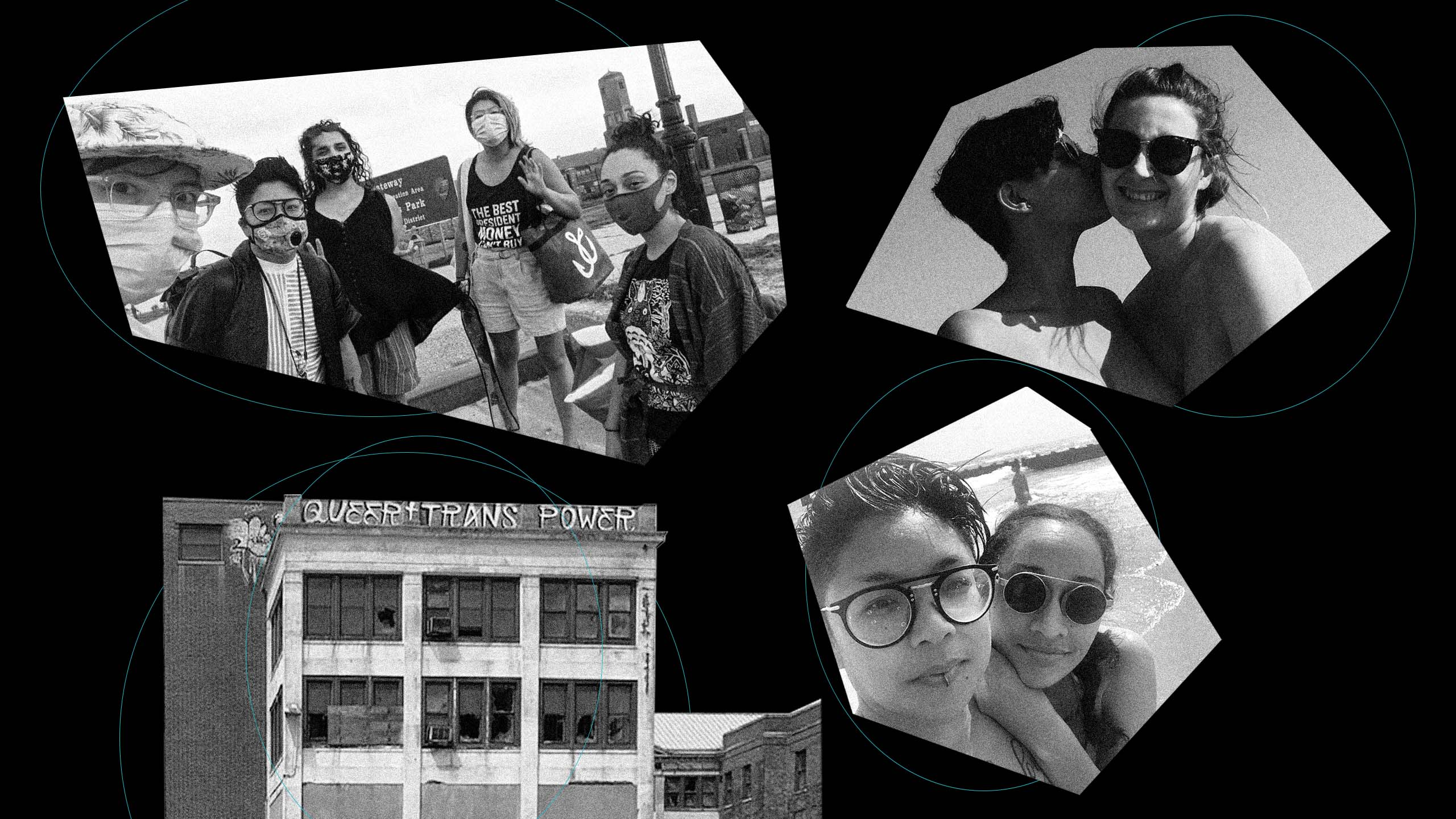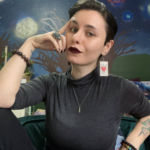Toilet paper is sticking to the bottom of my sandy feet and there are no paper towels left. Lipstick stains line the mirrors. I’m in a white sports bra and light blue swim trunks—masculine bathing attire—in the women’s restroom, though that doesn’t match my gender. Here it doesn’t matter. Here, anywhere I am is the right place to be. To my right is an old dyke with visible nipples who gives me a nod. To my left is a straight girl I disliked in college, startling me. I’m not sure why she’s in the bathroom at the queer part of Riis Beach. But looking to the dyke next to me brings me comfort, a reminder that I’m still in the right place. That this place is still for us, still safe.
Riis provides a liminal space where the laws and hatred from the outside world don’t seep in. It’s a place for blasting music, swapping life stories and laughs with people you just met, and people you’ve known for a lifetime. It feels like a church of sorts, a holy neighbourhood gathering centre. There’s always someone you know there. And it’s always been a place I’ve returned to when I’ve needed to bask in how endless the spectrum of queerness is, the depth and breadth of us existing so fully and, joyfully. It’s also a place that’s helped me to de-centre myself as a white queer person and learn which spaces are for me and which aren’t.
After being shut indoors for the better part of the year due to the pandemic, going to Riis Beach, a section of the Rockaways in New York City, was a needed respite and reminder of community during 2020. I’d been there before the pandemic, but there’s been something about the frenzied energy of the seaside that’s different, more coveted and remarkable, somehow, since so much touch and joy, and so many people, have been taken from us.
Now, after nearly a hundred years of this safe space being available to us, the state government has plans to tear down a long-abandoned hospital and replace it with a park. That would take away the building that kept this stretch hidden and allowed queer and trans people such a sacred space. Although queer and trans organizers from local communities around New York have been gathering to protest the removal of the medical centre, and to keep the history and spirit of the beach intact, the demolition plans are still moving forward, for now.
The beach has long been called the People’s Beach. Specifically, the stretch of sand and water behind Neponsit Beach Hospital on Bay 1 has been a deliberately and distinctively queer gathering space since around the 1940s. It’s prominently known for being a place for queer and trans people to cruise, hook up, hang out and be freely ourselves. “We were heading to the sun, to our piece of the beach where we could kiss and hug and enjoy looking at each other,” wrote Joan Nestle, writer and founder of the Lesbian Herstory Archives, of the special stretch of Riis.
It’s historically been a home away from home for Black queer and trans people and queer and trans people of colour who wish to gather to sunbathe and soak up the saltwater. Riis, simply put, has been a crucial meeting space for multiple generations of people in our community. And on any given day, it’s a safe place to commune with queers spanning generations, to witness each other. You’ll see elderly gay men slathering sunscreen on one another, femmes dancing around topless and smoking joints, groups of friends snapping pictures—folks living freely away from the cis straight gaze.

“Riis was one of the first places I experienced gender euphoria,” Naveen Kundanmal, a South Asian trans writer, says. “I was always intrigued by going to the beach topless, but I never really felt safe or comfortable doing so until I went to Riis with queer friends.” It was being surrounded by other queer and trans folks basking in the sunshine that felt magical and liberating to Kundanmal, and made them feel like they were at home, they say. This I know to be true for so many who have laid our bodies bare on the sand, the warmth of which is only rivalled by that of the sun-kissed queer and trans people intertwined with us.
For me, a trans non-binary person who’s lived in Brooklyn for nearly a decade and who’s found solace at Riis, I spent the summer of 2022 grappling with the reality that the place we once knew and loved might soon be gone. In the last few months, I’ve reminisced with friends and strangers alike about the best parts of Riis, trading stories about how its magic first found us, and how it’s come to heal us, respectively.
“As a transplant, I remember being in Riis in my mid-20s and it was one of the first times where there wasn’t a party, conference, overt political action or academic setting where it felt charged with celebrated queerness for me,” Kay Ulanday Barrett, a trans disabled Filipinx writer and cultural strategist says. They’ve been going to Riis for nearly 15 years.
“I’ve witnessed Black and brown people of all bodies and all abilities just reveling in summer and likely doing so hella naked,” Barrett shares. “It’s moved me in a spiritual way, to hear people being queer and not white and speaking many other languages that weren’t conventional white American English,” they add.
In one corner someone might be speaking Farsi, in another Dominican Spanish and patois in another close-by area on any given day. There is a vastness that reflects the greater area of New York City. “Riis gives queer BIPOC an oasis, gives poor people a break to enjoy a moment, gives working class vendors hustling to sell their rum punch or weed [a place to work/a marketplace]. Riis is a conduit to [the] ocean and ritual that other places riddled with tourists don’t spark in the same way,” Barrett says.
Where some people might feel mortified to run into their therapist, or say, an ex, in public, at Riis that’s not only a given, but a hilarious little bit of queerness to revel in. Riis is the very definition of community. A public beach, it’s a place to share food for free, to host Pride events that haven’t been commodified and turned ugly by corporations, a place to be completely nude, to fuck, to cry, to lose your shit after a bad week and a place to find yourself amid a life transition.
Like me, many other queer and trans people—especially those who are BIPOC—are concerned that the entirety of Riis might now become less safe, and may be stripped away of the very trans and queer communities that have made it so wonderful. Going to Riis feels like entering a parallel universe, and I hope we can find some way to keep that slice of our galaxy preserved.


 Why you can trust Xtra
Why you can trust Xtra


